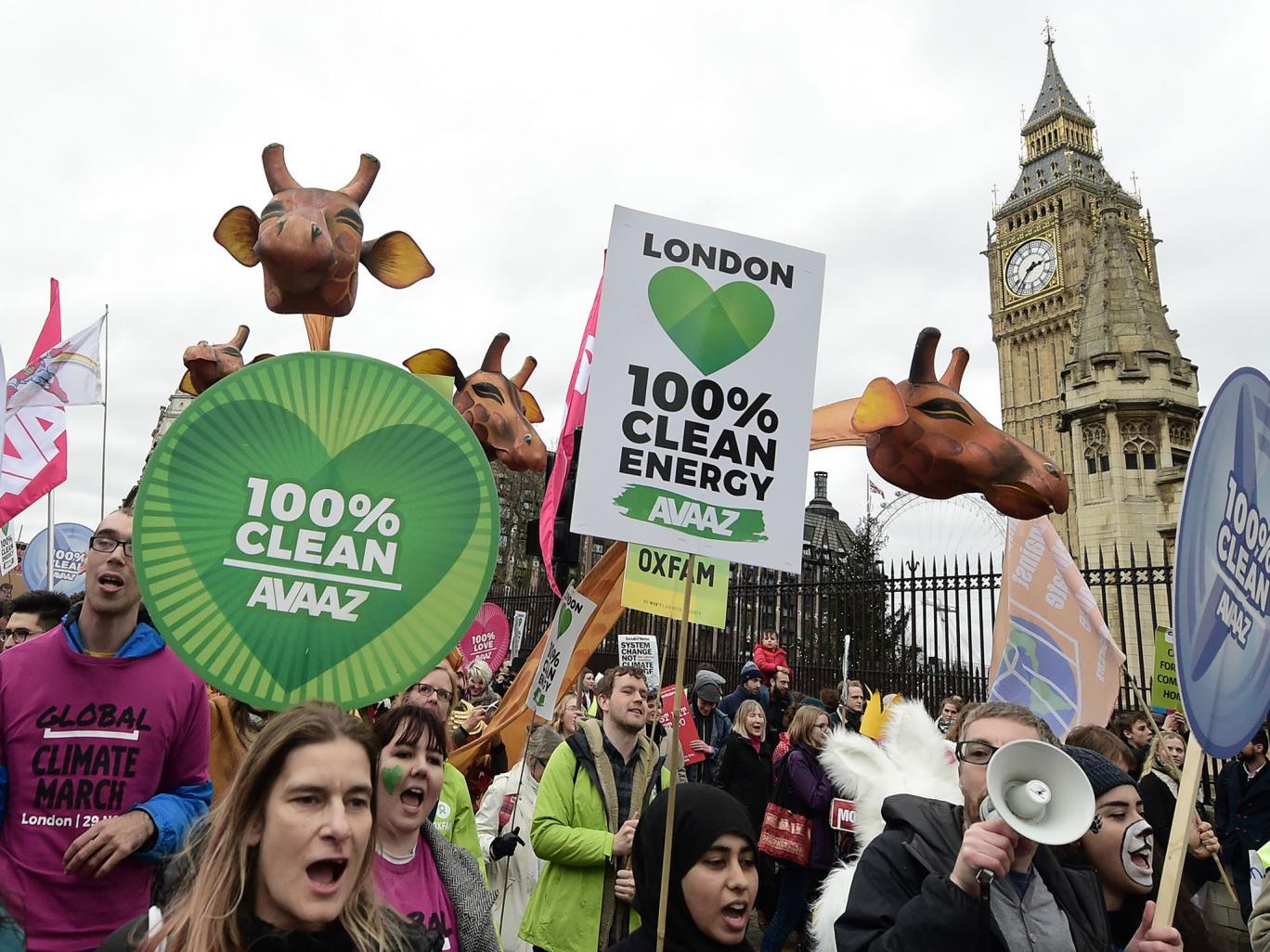UK must not abandon climate change fight after Brexit, Government experts say
Campaigners have expressed fears of a ‘bonfire’ of environmental regulations after Britain leaves the EU

The Government must not abandon the fight against global warming after Brexit – despite calls to do so from the climate-sceptic wing of the Conservative party – its official advisers have said in a report.
There are fears of a “bonfire” of regulations designed to protect the environment and reduce greenhouse gases after the UK leaves the European Union, which has developed world-leading standards.
In the report, the Committee on Climate Change (CCC) said its number one “key message” was that the UK’s climate goals “have not changed”.
Targets to reduce carbon emissions “must continue to be met after the UK has left the EU”, it stressed.
The UK is currently on course to cut emissions by only half the amount needed by 2030 and the CCC said there was an urgent need for action – rather than more promises.
A failure to switch to an energy efficient, clean and green economy could cause economic problems as British companies would struggle to sell their products in Europe, the CCC warned. In this scenario, firms on the continent might also engage in “dumping” of out-dated, polluting and expensive-to-run cars and consumer products on the UK market.
The Government has sent mixed messages on climate change.
One of Theresa May’s first acts was to scrap the Department for Energy and Climate Change, merging it into the renamed Department for Business, Energy and Industrial Strategy (BEIS).
But her Government has also signed up to tough targets to cut emissions and Business Secretary Greg Clark – whose remit now covers climate change – has stressed the UK will “continue to play our part in the transition to a global low-carbon economy”.
In a related report, the CCC said Britain had set “stretching targets” but what was now needed was “a robust plan” to actually achieve them.
There would need to be “economy-wide improvements” to energy efficiency and the phasing out of fossil fuel emissions from vehicles, heating and power stations, it said.
“Acting with urgency” to address this problem would reduce the costs of making the switch in the long-term, it added.
The CCC also said steps to suck carbon dioxide out of the atmosphere “will be required”, suggesting this could be done by planting trees, burning biomass in power stations with carbon capture-and-storage systems and even “direct air capture and storage”.
“Existing commitments need strong new policies that set a clearer direction across the economy, irrespective of Brexit,” the CCC said.
“The fifth carbon budget requires a reduction in emissions of around a third from 2015 to 2030 … current policies, including those agreed to by the UK at the EU level, would at best deliver about half the required emissions reduction.”
The Government is expected to set out its emissions reduction plan in the next few months and this “must be able to meet the UK’s carbon budgets whatever the circumstances as the UK leaves the EU”, the CCC added.
The right-wing of the Conservative party is the last bastion of significant climate scepticism in parliament.
The current Environment Secretary, Andrea Leadsom, revealed she had asked officials only last year whether climate change was real, although she added they had convinced her.
But only last month Tory MP David Davies – not to be confused with Brexit Secretary David Davis – said he would be about to “outfox any of those so-called scientists” and attacked the BBC for accepting “hook, line and sinker the so-called scientific consensus around climate change”.

Simon Bullock, a climate campaigner at Friends of the Earth, said some politicians would see Brexit as an opportunity to do away with climate change policies they regard as “wasteful, bureaucratic red tape”.
But he told The Independent: “I think what the CCC are trying to do in their report is say there’s no case for that.
“They are saying there are arguments from people to both strengthen and weaken climate change targets, but the fundamental thing for us [the CCC] is the targets we have got, we are not meeting. Reading between the lines, I wonder whether they are concerned that arguments either way detract from the real business of meeting the targets we have already got.”

Greenpeace UK’s chief scientist Dr Doug Parr said the CCC report was “a small haven of clarity and stability” about climate change “amidst the Brexit maelstrom”.
“Theresa May’s government should now make sure the big decisions still to be made on energy and transport are aligned with this roadmap to a low-carbon future,” he said.
“Despite helpful promises on tackling coal, ministers are supporting polluting fracking and expensive nuclear and they may now on the verge of green-lighting another high-carbon project with airport expansion.
“If the Prime Minister wants to build a successful industrial strategy for the 21st century Britain, low-carbon energy and transport infrastructure needs to sit at the heart of it. That’s the clear direction of the global economy, and if the UK wants export markets it will be in its own long-term self-interest to do the same.”

BEIS said in a statement it would “carefully consider the valuable advice from the Committee on Climate Change”.
“We are already making good progress towards meeting our goal of reducing emissions by at least 80 per cent by 2050 on 1990 levels, and we are now looking ahead to set out how we will continue to decarbonise through the 2020s,” it said.
“Our plan will send an important signal to the markets, businesses and investors so we want to take the time now to get it right.”
Join our commenting forum
Join thought-provoking conversations, follow other Independent readers and see their replies
Comments
Bookmark popover
Removed from bookmarks